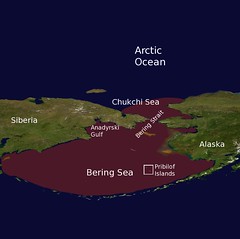Just when you think that messages and understanding are spreading, recent personal observations suggest otherwise. The data are increasing, we may already be experiencing impacts, and there is a growing awareness globally of the climate change problem. At the same time, however, I see both an increase in alarmism, and the perhaps predictable reactionary responses from disingenuous and ill-informed skeptics.
Geerat Vermeij and I recently published a short article in Science outlining our predictions of some of the effects that a future ice-free Arctic will have on the diversity of molluscs and other animals in the Arctic and North Atlantic oceans. The main predictions are that (1) species in the Bering and Chukchi seas (see figure) will migrate and invade the Arctic and North Atlantic, and that (2) as a consequence, diversity will increase in both those regions. We point out that although the invading species will most likely be competitively superior to their native counterparts, that we remain agnostic, or at least uncertain, of the ecological consequences of the invasion. (See, for example, this press release.) It was very interesting to see the story picked up by news agencies around the world. Nevertheless, it was also interesting, and somewhat amusing, to see negative comments posted on many blogs and newsites accusing us of all sorts of things. For example, several commentators wondered why we expect an increase in diversity to be "harmful". My response is simple: We never said that it would be harmful, and my advice to those individuals is that they spend more time reading, and less time writing. One fellow, presumably from a state on the East Coast, said, "I'll happily keep my SUV chugging if it means more shellfish on the table." That's funny! It really is. Some of you who know me well wouldn't be surprised to hear me say something cynically funny if I were standing on the foredeck of the Titanic. I would, of course, also have realized the gravity of the situation (no pun intended), and the futility of my unrecorded comment.
Another example was brought to my attention recently in a comment to the blog regarding an article by Wall Street writer Bret Stephens. Mr. Stephens expounds, in this article, the usual agenda-driven skepticism that I've come to expect from short-sighted and frankly, unintelligent economists. He leaps upon a recent error in NASA's reporting of the hottest year since instrument records have been kept, noting that it was 1934, not 1998. NASA made a boo-boo, but shame on Mr. Stephens. NASA is not responsible for keeping and reporting on our temperature records, NOAA is. And the far more accurate and reliable NOAA records remain unequivocal. Mr. Stephens also makes reference to recent reports that the planet is undergoing a cooling trend, and rather cynically (I could like this guy in another lifetime) questions the reliability of "apocalyptic" predictions. He is presumably referring to this article (apparently journalists, unlike scientists, are trustworthy enough to not have to cite their sources) which reports a cooling trend over the next 20 years. Indeed correct. Those scientists report on the increasing trend of a long-term oscillation in climate which will imprint a cooling signature onto anthropogenic warming for the next two decades, after which, it'll be all warming again. This is not refutation folks, it's a reprieve! Let's put those 20 years to good use. My point is that skeptics such as Mr. Stephen's would do well to separate science from their own professional concerns. I'm not even sure what those concerns are, since economic reports and forecasts seem to be so far removed from the current reality of negative experiences by many of the people enrolled in those economies.
Finally, I would like to suggest some caution to the "other" side of the debate. Alarmist statements without sound scientific underpinnings are not helpful. There are still a lot of open questions; they're the ones that keep me optimistic. I've heard recent reference to the consequences of a 5 meter rise in sea level this century. Uhm yes, that would be horrific, and yes, it's possible. But it is not, to the best of our current knowledge, probable. So let's keep it honest. I don't know if Pacific shellfish will devastate the North Atlantic. I am fairly certain that their bags are packed and they're ready to go. Perhaps the guy with the chugging SUV will agree to send me his notes.
